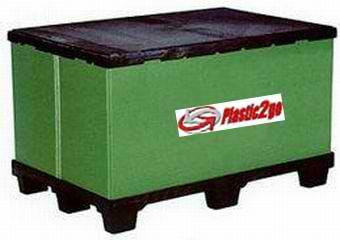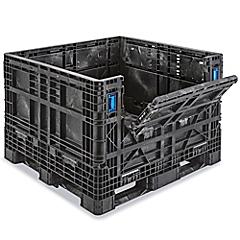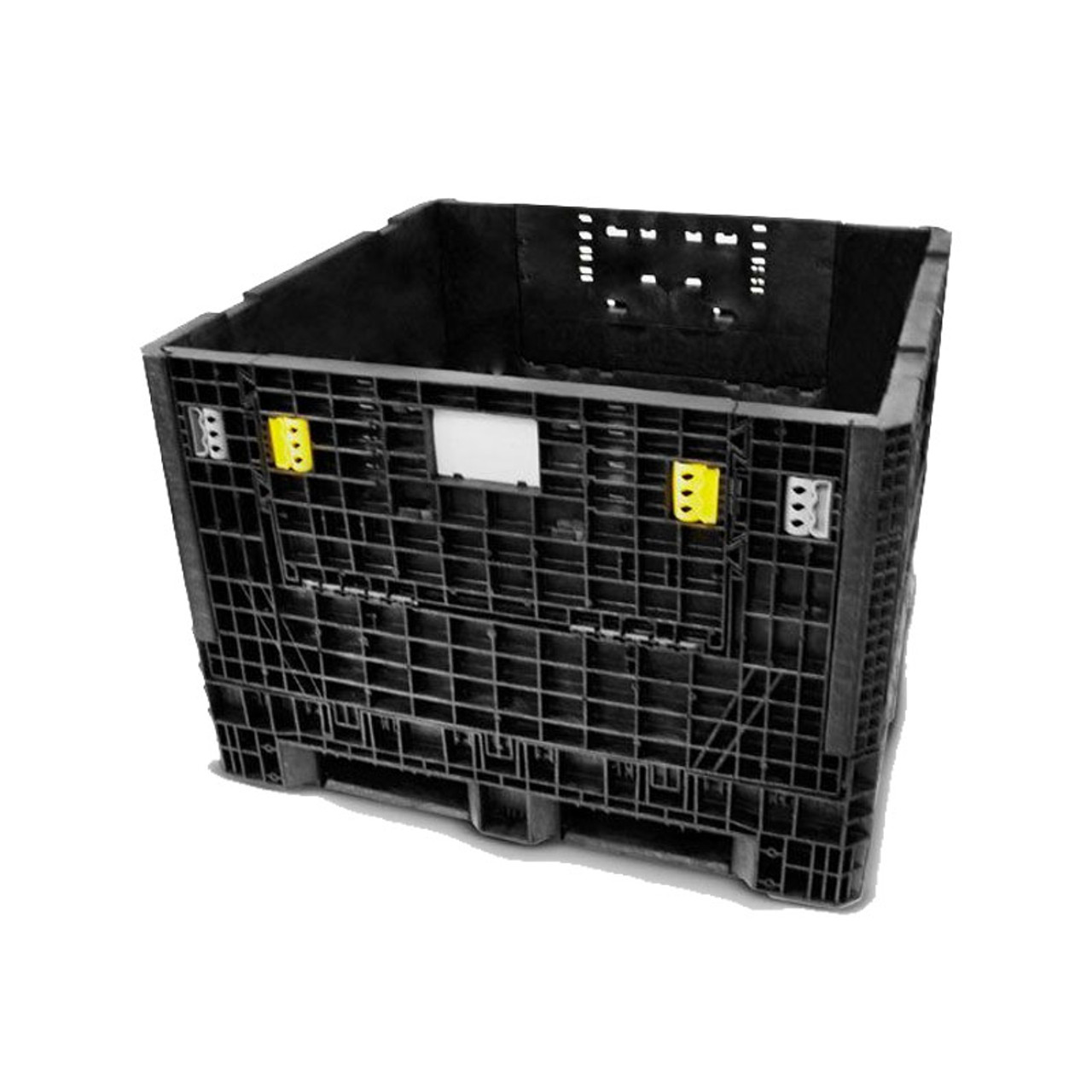The Function of Bulk Plastic Containers in Effective Recycling Practices and Sustainability
Bulk plastic containers are essential to modern-day reusing efforts. Their design boosts the efficiency of material collection and transportation, adding to sustainability goals. These containers not only optimize room yet additionally assist in keeping track of contamination degrees. Their execution is not without difficulties. Comprehending the complete extent of their impact exposes an intricate relationship in between logistics and ecological obligation that requires further exploration.
Recognizing Mass Plastic Containers
Mass plastic containers serve as an important element in various industries, facilitating the storage space and transport of goods. These containers are normally made from durable products such as high-density polyethylene (HDPE) or polypropylene, which give longevity and resistance to ecological factors. Their style frequently consists of functions like stackability and modularity, permitting efficient use room throughout both storage and transit.
Industries such as agriculture, food processing, and producing frequently use mass plastic containers due to their lightweight nature and convenience of handling. The containers come in various sizes and arrangements, accommodating the certain demands of different products. Their convenience prolongs past simple performance; they can additionally be tailored with lids, manages, and labeling alternatives to boost usability - bulk plastic containers for sale. Consequently, bulk plastic containers play an important role in maximizing logistics and supply chain procedures across numerous fields, therefore adding to overall performance and cost-effectiveness
Benefits of Making Use Of Mass Plastic Containers in Recycling
When companies prioritize reusing efforts, the use of bulk plastic containers greatly improves the performance of the procedure. These containers are made to optimize room, permitting for the storage and transport of bigger amounts of recyclable materials. This leads to less journeys to reusing facilities, consequently minimizing gas usage and linked exhausts.
In addition, bulk plastic containers are sturdy and resistant to different ecological variables, guaranteeing that materials stay shielded during handling and transit. Their lightweight style better contributes to decrease transport prices.
Furthermore, the uniformity of these containers helps with much better sorting and handling of recyclable materials, which can enhance overall recycling rates - Bulk Plastic Containers. Organizations that embrace bulk plastic containers additionally show a dedication to sustainability, positively affecting their brand name photo. Eventually, these benefits not just simplify reusing techniques however also contribute to more comprehensive ecological objectives
Exactly How Mass Plastic Containers Facilitate Material Collection
Effective material collection is significantly improved by the usage of mass plastic containers, as they give a structured and reliable service for collecting recyclable things. These containers are created to suit huge quantities of products, which streamlines the sorting and storage process. Their stackable style maximizes area utilization, making it simpler for centers to organize recyclables without clutter.
Additionally, bulk plastic containers are weather-resistant and sturdy, permitting outdoor placement without destruction. This resilience guarantees that materials remain protected till they are gathered for processing.

The harmony in dimension and shape of these containers promotes standardization throughout collection factors, allowing better monitoring of recyclable quantities. Additionally, their clear nature enables very easy exposure of contents, aiding in the tracking of contamination levels and ensuring that just suitable products are accumulated. Generally, mass plastic containers play a critical function in simplifying the material collection procedure, thus promoting effective reusing practices.
Transportation Effectiveness and Environmental Impact
Transport efficiency plays a vital duty in the recycling process, especially with the optimization of load ability wholesale plastic containers. By making best use of the quantity of material transported, firms can substantially reduce the number of journeys required, thus minimizing their carbon footprint. This strategy not only boosts operational effectiveness but likewise adds to more sustainable environmental techniques.

Maximizing Load Capability
Enhancing load capability is commonly forgotten, it plays a vital duty in boosting transportation effectiveness and decreasing ecological impact in recycling methods. By maximizing the volume that mass plastic containers can hold, reusing procedures can lower the number of trips needed for transportation. This not just lowers gas usage but likewise lowers the damage on vehicles. Efficient tons monitoring enables centers to make use of area properly, making sure that each transportation cycle is as productive as feasible. Furthermore, well-optimized lots can cause far better arrangements with logistics providers, potentially minimizing overall prices. Eventually, boosting tons ability adds to a much more sustainable reusing system by promoting efficient resource use and decreasing waste created during transport.
Reducing Carbon Impact
As recycling procedures undertaking to reduce their ecological impact, minimizing the carbon impact connected with transportation becomes an essential goal. Mass plastic containers play a critical duty in attaining this purpose by enhancing lots performance and enhancing logistics. Their lightweight yet sturdy layout permits for maximum cargo room utilization, reducing the number of journeys called for to carry materials. By combining deliveries, recycling facilities can decrease gas consumption and greenhouse gas exhausts. Additionally, purposefully finding recycling facilities lessens transport distances, furthermore lowering carbon outcomes. Moreover, utilizing fuel-efficient vehicles and alternative power resources enhances total sustainability. By integrating these methods, the recycling market can substantially decrease its carbon footprint, adding to a much more sustainable future.
Challenges in using Bulk Plastic Containers

Contamination Problems
Contamination problems stand for a substantial challenge in the efficient use bulk plastic containers within reusing techniques. These containers typically gather deposits from previous contents, causing combined products that can hinder the recycling process. Pollutants such as food waste, chemicals, or non-recyclable materials can jeopardize the honesty of the whole set, resulting in raised disposal expenses and reduced reusing prices. In addition, incorrect cleaning or sorting can intensify these problems, making it tough for reusing centers to refine products efficiently. The existence of pollutants not only impacts the high quality of recycled items however likewise threatens the total sustainability efforts targeted at reducing plastic waste. Attending to these contamination obstacles is crucial for enhancing the efficacy of mass plastic container recycling.
Recycling Framework Limitations
Inadequacy in recycling infrastructure presents considerable challenges for the effective management of bulk plastic containers. Several reusing centers lack the capacity to refine big volumes of these containers efficiently, leading to boosted expenses and delays. Additionally, poor sorting technologies commonly cause contamination, as bulk containers may be combined with other materials, making complex the reusing process. Limited transportation choices also hinder the activity of mass plastic containers to appropriate reusing facilities, causing boosted landfill waste. In addition, a lack of standard procedures for mass container recycling develops confusion among businesses and consumers, additionally complicating initiatives to promote sustainability. Attending to these facilities restrictions is essential to boost recycling techniques and take full advantage of the possibility of bulk plastic containers in a round economic situation.
Ideal Practices for Carrying Out Bulk Plastic Containers
They need to prioritize a tactical approach that improves effectiveness and decreases contamination risks when companies think about executing mass plastic containers in their reusing practices. Choosing the appropriate container dimension and type is vital to suit the volume of products being refined. Organizations must also develop clear labeling and signs to guide individuals on proper disposal techniques, lessening complication and errors. Normal training sessions for team can better strengthen these techniques, ensuring everybody comprehends their duties in keeping reusing honesty.
In addition, organizations must execute a routine upkeep routine to examine and clean containers, avoiding the buildup of contaminants. Partnering with local reusing centers can also improve the collection procedure, making certain that materials are efficiently refined. Companies ought to check and examine their reusing metrics, utilizing this data to improve techniques over time and advertise continual improvement in their sustainability efforts.
The Future of Mass Plastic Containers in Sustainable Practices
As organizations significantly prioritize sustainability, the duty of bulk plastic containers in recycling practices is readied to evolve considerably. Advancements in products scientific research are resulting in the advancement of naturally degradable and recyclable options, improving the ecological advantages of bulk plastic containers. Furthermore, the execution of closed-loop systems will certainly enable less complicated collection and repurposing of these containers, reducing waste and source usage.
Technical advancements, such as smart monitoring systems, will allow business to keep track of the lifecycle of mass containers, improving performance in reusing procedures. As consumer need for lasting practices grows, services will likely take on bulk plastic containers created for reuse and lasting worth. Additionally, partnership between governments and industries will certainly cultivate the facility of standard reusing methods, making sure that mass containers are effectively incorporated into more comprehensive sustainability initiatives. On the whole, the future of bulk plastic containers shows up appealing, with considerable possibility for adding to a circular economic situation.
Regularly Asked Inquiries
Exactly How Are Mass Plastic Containers Made and What Products Are Made use of?
Bulk plastic containers are commonly made from high-density polyethylene (HDPE) or polypropylene (PP) These materials are processed via injection molding or strike molding techniques, resulting in sturdy, lightweight containers appropriate for various storage space and transport demands.
Can Mass Plastic Containers Be Recycled Numerous Times Before Recycling?
Yes, bulk plastic containers can be recycled several times before reusing. Their resilience and layout enable for duplicated use in various applications, promoting sustainability and source effectiveness while minimizing the demand for new containers.

What Qualifications Exist for Bulk Plastic Containers in Recycling?
Various qualifications for bulk plastic containers include the Recycling Partnership's qualification, the Cradle to Cradle Qualified ™ requirement, and the Lasting Product packaging Coalition's guidelines, ensuring containers fulfill details ecological and recyclability standards for efficient recycling.
How Do Bulk Plastic Containers Compare to Various Other Recycling Storage Options?
Mass plastic containers use higher sturdiness Bulk Plastic Containers and capacity contrasted to various other recycling storage options, lowering the risk of contamination and assisting in reliable transport. Their style supports far better company, enhancing general effectiveness in reusing procedures.
What Is the Lifespan of a Mass Plastic Container in Recycling Processes?
The life-span of a bulk plastic container in recycling processes usually ranges from 5 to one decade, depending on usage, worldly high quality, and environmental problems, enabling numerous cycles of usage before ultimate disposal or recycling.
When organizations focus on recycling efforts, the utilization of bulk plastic containers greatly improves the performance of the procedure. Transportation performance plays a necessary duty in the recycling process, specifically with the optimization of lots capability in bulk plastic containers. The usage of bulk plastic containers in reusing practices deals with substantial challenges, particularly concerning contamination concerns and constraints within reusing facilities. Contamination problems stand for a significant challenge in the effective use of bulk plastic containers within reusing methods. When companies think about carrying out bulk plastic containers in their reusing practices, they should prioritize a critical technique that enhances effectiveness and minimizes contamination risks.